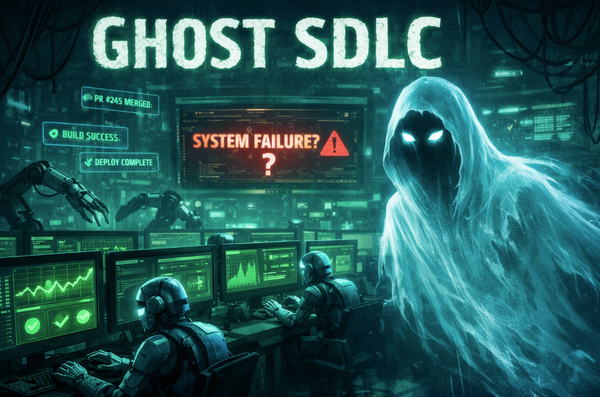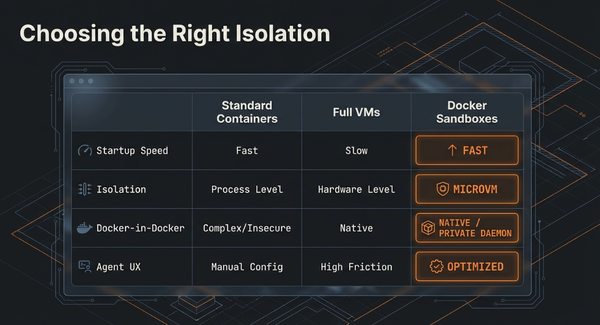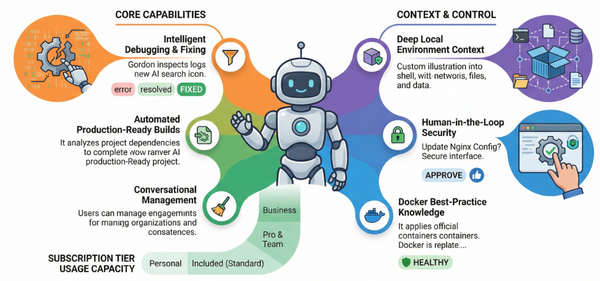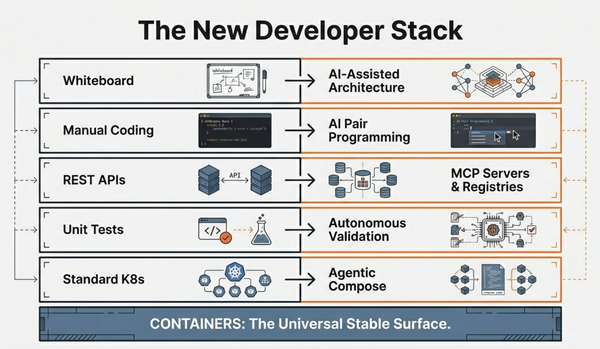Docker Desktop: The Infrastructure Foundation for Agentic AI
How Docker is solving the packaging and security challenges that will define the next generation of intelligent agents
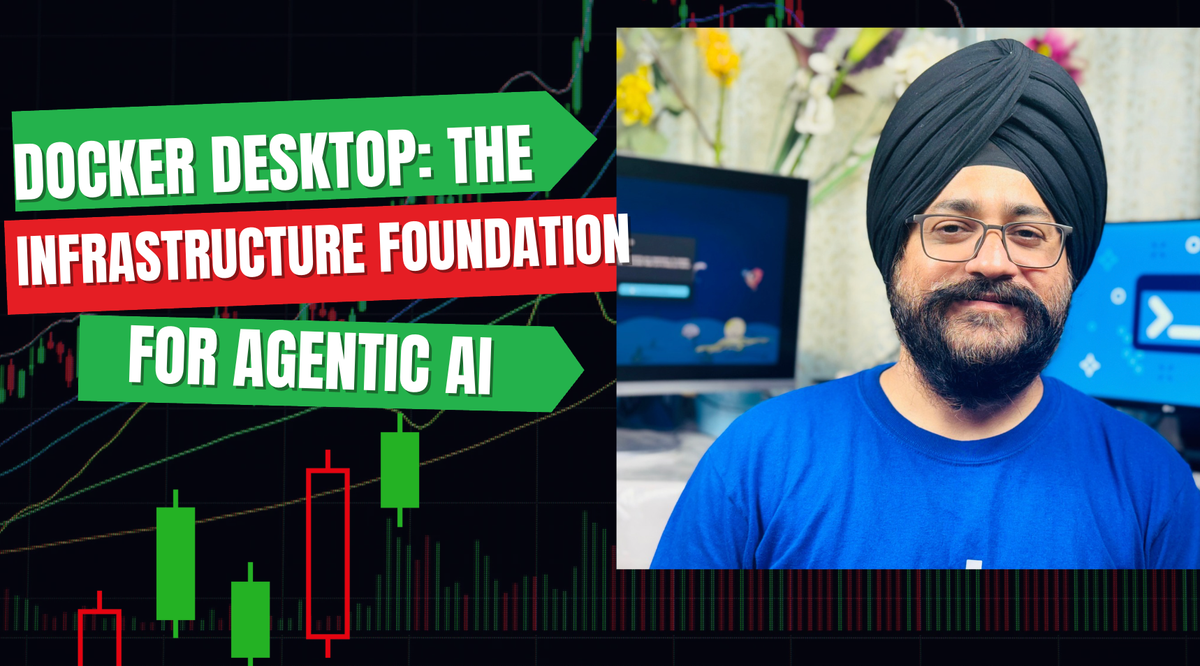
We're witnessing a fundamental shift in how AI systems operate. Where yesterday's AI generated text, today's AI takes action. This evolution from language models to autonomous agents represents one of the most significant technological inflections since the rise of cloud computing. And just like the early days of the cloud, we're seeing familiar patterns emerge: immense potential paired with fragmented tooling, security concerns, and distribution challenges.
The parallels are striking. In the early 2010s, developers struggled with "dependency hell," inconsistent environments, and complex deployment processes. Applications that worked perfectly on one machine would mysteriously fail on another. Security was an afterthought, and discovering trusted software meant navigating scattered repositories and forum threads.
Sound familiar? Because that's exactly where agentic AI finds itself today.
The Model Context Protocol: A New Standard Emerges

The introduction of Anthropic's Model Context Protocol (MCP) has created the first standardized way for AI agents to connect with external tools and data sources. Think of MCP as the API layer for intelligent agents—enabling them to interact with everything from filesystems and databases to third-party services like GitHub, Slack, and Kubernetes clusters.
But here's where it gets interesting: the same challenges that plagued early cloud adoption are now surfacing in the MCP ecosystem. Developers are downloading servers from scattered repositories, wrestling with dependency conflicts, and running untrusted code directly on their machines. Environment variables store sensitive credentials in plaintext. Cross-platform compatibility remains a constant headache.
As David Soria Parra from Anthropic puts it: "Building an MCP server for ffmpeg would be a tremendously difficult undertaking without Docker. The same way it solved the packaging problem for the cloud, it now has the potential to solve the packaging problem for rich AI agents."
This isn't just about convenience—it's about trust, security, and the foundational infrastructure that will determine whether agentic AI reaches its full potential or gets bogged down in the same problems that once held back cloud adoption.
Beyond Packaging: The Four Pillars of Agentic Infrastructure

Docker's approach to agentic AI isn't just about containerizing MCP servers—though that's certainly part of it. Instead, Docker is building what we might call the "four pillars" of agentic infrastructure:
1. Discovery and Trust
The Docker MCP Catalog represents something the ecosystem desperately needs: a centralized, trusted marketplace for AI tools. With over 100 verified tools from industry leaders like Stripe, Elastic, Neo4j, and Grafana Labs, it eliminates the fragmented discovery process that has characterized early MCP adoption. Publisher verification, versioned releases, and curated collections ensure developers can find exactly what they need without compromising on security.
2. Seamless Distribution
Just as Docker Hub transformed how we share and deploy applications, the MCP Catalog leverages the same proven infrastructure that handles billions of image pulls monthly. MCP tools become as easy to deploy as spinning up Redis or Postgres—a single command that "just works" across any environment where Docker runs.
3. Security by Default
Perhaps most critically, Docker is addressing the security challenges that have emerged as MCP adoption accelerates. New threat vectors like "MCP Rug Pull" attacks (where malicious servers alter tool descriptions after user approval), "MCP Shadowing" (injecting misleading tool descriptions), and "Tool Poisoning" (hiding malicious instructions in tool metadata) require purpose-built defenses.
The Docker MCP Toolkit introduces a Gateway architecture that acts as a security checkpoint—every MCP interaction passes through a single, controlled endpoint where threats can be detected and stopped before reaching the AI client. Combined with container-based isolation, encrypted credential management, and runtime access controls, this creates a security model that scales from development to production.
4. Developer Experience
The Docker MCP Toolkit transforms the developer experience from complex manual setup to one-click deployment. MCP servers launch in seconds, connect automatically to clients like Claude, Cursor, VS Code, and other platforms, and include built-in OAuth management integrated with Docker Hub accounts. The familiar docker mcp CLI makes building and managing tools feel natural to any developer already working with containers.
The Production Readiness Gap

What makes Docker's approach particularly compelling is its focus on production readiness. Early MCP experimentation has been characterized by what Docker aptly describes as "setting off fireworks in your living room"—thrilling, but not very safe.
The current typical MCP configuration looks like this:
{
"mcpServers": {
"command": "npx",
"args": ["-y", "@org/mcp-server", "--user", "me"],
"env": {
"SECRET_API_KEY": "YOUR_API_KEY_HERE"
}
}
}This works for prototypes, but it's pulling code directly from the internet, executing it on the host machine, and passing sensitive credentials as plaintext environment variables. As agentic systems move toward production deployment, this approach simply doesn't scale.
Docker's containerized approach transforms this into:

{
"mcpServers": {
"mcpserver": {
"command": "docker",
"args": [
"run", "-i", "--rm",
"alpine/socat", "STDIO", "TCP:host.docker.internal:8811"
]
}
}
}The MCP client sees a managed view of configured MCP servers, but everything runs through Docker's secure infrastructure with proper isolation, credential management, and threat detection.
The Ecosystem Effect
What's particularly strategic about Docker's approach is how it enables ecosystem growth without vendor lock-in. The MCP Catalog and Toolkit work with any MCP client today—Claude, Cursor, VS Code, Windsurf, Continue.dev, Goose, and future platforms yet to be built.
This creates a powerful network effect. Tool builders get access to a trusted distribution channel that reaches millions of developers. Platform creators can offer their users a rich ecosystem of verified, secure tools without building their own infrastructure. End users benefit from the safety and simplicity of containerized deployment without sacrificing flexibility or choice.
The partnerships Docker has secured—Stripe, Elastic, Heroku, Pulumi, Grafana Labs, Kong, Neo4j, New Relic, and Continue.dev among others—signal something important: this isn't just Docker betting on agentic AI, it's the broader developer tools ecosystem recognizing that proper infrastructure is essential for the next phase of AI adoption.
The Inflection Point
We're at a classic technology inflection point. MCP has emerged as the de facto standard for agentic AI interaction, but the experience isn't production-ready yet. The choices made today about infrastructure, security, and developer experience will determine whether agentic AI follows the cloud's trajectory—from experimental to ubiquitous—or gets trapped in an early adopter phase.
Docker's bet is that the same principles that transformed cloud deployment—standardization, containerization, centralized distribution, and security by default—will be equally transformative for agentic AI. The early evidence suggests they're right.
As agents move from generating text to taking real action in production environments, the infrastructure that supports them becomes critical infrastructure. Docker isn't building an agentic AI platform—they're building the foundation that every agentic AI platform will need to succeed.
That might be an even more important role.
The Docker MCP Catalog and Toolkit are now available in beta. To learn more about how Docker is enabling the next generation of agentic AI systems, visit hub.docker.com/catalogs/mcp.
